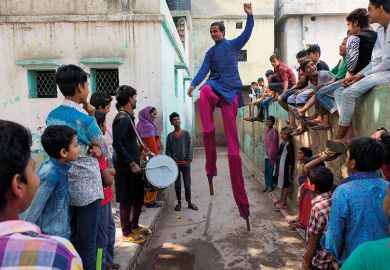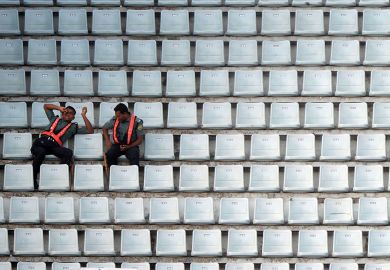India is the second-largest education ecosystem in the world, yet there is currently no Indian university in the global top 100 list released by international ranking agencies for 2023.
Perhaps that is not a surprise when the country’s education budget has never reached the target of 6 per cent of GDP set out in the National Education Policy (NEP) – and achieved by the likes of Brazil and Indonesia – it has hovered a little below 3 per cent over the past few years. Research spending, meanwhile, is just 0.7 per cent of GDP, which is extremely inadequate.
Although a handful of new private universities have recently been established with philanthropic funding that aspire to high teaching standards, a study by Pushpa Sundar on corporate philanthropy reveals that, perhaps for reasons of prestige, rich Indians typically donate to high-ranking foreign universities instead of giving to Indian institutions – even their own alma maters.
Philip Altbach, research professor and distinguished fellow at the Center for International Higher Education at Boston College, is certainly not alone in believing that India needs a few world-class universities as an emblem of its status as an economic powerhouse and the important role it plays in the global arena. Indeed, India’s NEP, published in 2020, encourages the establishment of multidisciplinary education and research universities (MERUs), with the objective of providing holistic, high-quality education to Indian students at a global standard. And it provides for several enabling regulations through which Indian institutions can improve their quality, rankings and global visibility.
But with such poor funding levels, it will be difficult for any Indian institution to gain world-class status by itself any time soon – all the more so because many are currently grappling with challenges on multiple fronts, including low student enrolment, faculty shortages, the transition from three- to four-year undergraduate programmes (as stipulated by the NEP) and incorporating technology into teaching.
However, one interim solution might be for Indian institutions to come together to design and deliver multidisciplinary bachelor’s and master’s programmes in some of the emerging fields that will be relevant to addressing the UN Sustainable Development goals. The training required to prepare such interdisciplinary experts will require the pooling of faculty expertise that is spread across different universities, to produce educational programmes that can be delivered at multiple institutions.
For example, an infectious disease epidemiologist needs to be trained in classical epidemiology, mathematical modelling, behavioural science, pathogen evolution and genomics. But there are currently very few Indian institutions that can offer training both in biological sciences and mathematical modelling under one roof. However, several Indian institutions, such as Jawaharlal Nehru University and the Indian Statistical Institute, could come together to design courses in infectious disease epidemiology.
The study of climate science also involves a large number of disciplines, including geography, geology, environmental science, engineering and disaster response. And a programme that combined expertise in air quality modelling, climate change and public health would broaden understanding of the burden of disease attributable to air pollution in India.
The US has several examples of universities that have come together to create world-class collaborations in diverse fields. For example, the Broad Institute in Cambridge, Massachusetts draws on expertise from both Harvard University and the Massachusetts Institute of Technology to apply genomics to the treatment of human disease and help lay the groundwork for a new generation of therapies. And The Santa Fe Institute in New Mexico was formed to study complex systems by a group of scientists from diverse fields, most of whom have primary affiliations elsewhere.
One of the highlights of the NEP is the formulation of a National Credit Framework, an overarching framework to enable seamless integration and coordination across regulators and institutions to facilitate broad-based, multidisciplinary, holistic education across sciences, social sciences, arts, humanities and sports. One of the explicit objectives is to promote internationalisation of Indian education by enabling credit transfer for students, but the mechanism could also be leveraged to encourage student exchange between higher education institutions within India.
Moreover, the University Grants Commission, India’s regulator, has floated a draft proposal for dual degree and twinning programmes with accredited foreign higher education institutions. This initiative is laudable but it will take time, money and effort to design programmes that involve institutions from different countries. Also, cross-border programmes come with a price tag that many Indian students may not be able to afford.
Domestic collaborations could be established more quickly and cheaply, and could be driven by another key NEP recommendation, the National Research Foundation. This body, whose creation has recently been approved by the government, is intended to fund and foster a research culture by coordinating with India’s universities, colleges, research institutions and R&D laboratories.
Such collaborative efforts could seed the formation of new institutions that will eventually emerge as world-class, both addressing India’s research and training needs and increasing the global prestige of its education system.
Diya Dutt is adviser at the Association of Indian Universities and former deputy director of the United States-India Educational Foundation, New Delhi. Sudarshan Saha is director of the Center for Study Abroad in Guwahati, Assam and former EducationUSA advising coordinator at the United States-India Educational Foundation, Kolkata.
Register to continue
Why register?
- Registration is free and only takes a moment
- Once registered, you can read 3 articles a month
- Sign up for our newsletter
Subscribe
Or subscribe for unlimited access to:
- Unlimited access to news, views, insights & reviews
- Digital editions
- Digital access to THE’s university and college rankings analysis
Already registered or a current subscriber?








